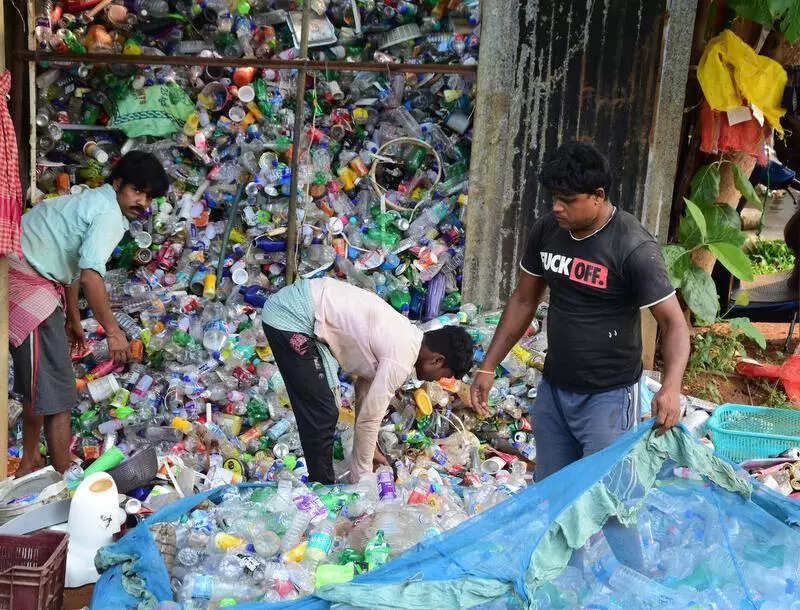Urgent Call for Action Against Plastic Pollution by Health Experts | Bhubaneswar News

Bhubaneswar: Plastic pollution poses significant challenges not only to the environment, but also for human health. Given the far reaching consequences of plastic pollution, experts have demanded urgent intervention from the general public as well as authorities to address the problem.
On the occasion of National Pollution Prevention Day on Monday, medical experts highlighted how plastic pollution is impacting human health and the respiratory system, especially in children, and suggested ways to prevent the damage.
The doctors’ conference, organised by voluntary organisation India Clean Air Network (IndiaCAN), was attended by experts in critical care medicine, paediatrics, neonatology, and medical officers of govt-run medical centres. The event aimed to highlight the urgent health concerns posed by plastic pollution and microplastics.
Dr Mamata Panda, senior consultant in paediatrics and neonatology at a city-based private hospital pointed out how children are particularly vulnerable to the harmful effects of microplastics.
“These tiny particles, present in the air they breathe, the water they drink, and even the food they consume, can accumulate in their bodies, potentially causing long-term health issues. Microplastics are not just environmental pollutants; they can disrupt brain development as well,” Panda said.
During the event, a survey report titled “Urbanisation & Solid Waste Production: Environmental Implications in Bhubaneswar, Odisha,” was released, which highlighted the challenges posed by plastic pollution in the state capital.
According to the survey report, Bhubaneswar generates about 500 tonnes of solid waste every day, which consists of approximately 61.81% biodegradables, 27.15% inert material, 7.8% plastic and leather, and 1.25% metal and glass. The city generates around 30 tonnes of plastic waste per day.
The temporary transit station near Sainik School continues to accumulate waste without adequate processing. Bhausuni dumping yard further relies on outdated practices, with waste being discarded in the open, exacerbating environmental risks, the report stated.
Dr Arpita Subhadarshini, medical officer at the urban primary health centre in Bhubaneswar, said the crisis of plastic pollution and the proliferation of microplastics demand urgent attention. “These pollutants contaminate our ecosystem and disrupt the principles of a circular economy,” she said.
According to Dr Pragyan Kumar Routray, senior consultant in critical care medicine at a city-based private hospital, plastic pollution, particularly microplastics, has silently infiltrated everyday life, posing significant risks to public health.
“These particles, with harmful chemicals, can accumulate in vital organs and disrupt critical bodily functions. They can lead to long-term health issues, including cancers and cardiovascular diseases. It is crucial for us as a society to act now to reduce plastic use,” Routray said.
Ajay Mittal, co-chairperson of networks at IndiaCAN, said Bhubaneswar also struggles with insufficient infrastructure for the primary collection, storage and transportation of waste. “Lack of awareness and a fragmented approach to land monitoring have intensified the problems,” he said.
On the occasion of National Pollution Prevention Day on Monday, medical experts highlighted how plastic pollution is impacting human health and the respiratory system, especially in children, and suggested ways to prevent the damage.
The doctors’ conference, organised by voluntary organisation India Clean Air Network (IndiaCAN), was attended by experts in critical care medicine, paediatrics, neonatology, and medical officers of govt-run medical centres. The event aimed to highlight the urgent health concerns posed by plastic pollution and microplastics.
Dr Mamata Panda, senior consultant in paediatrics and neonatology at a city-based private hospital pointed out how children are particularly vulnerable to the harmful effects of microplastics.
“These tiny particles, present in the air they breathe, the water they drink, and even the food they consume, can accumulate in their bodies, potentially causing long-term health issues. Microplastics are not just environmental pollutants; they can disrupt brain development as well,” Panda said.
During the event, a survey report titled “Urbanisation & Solid Waste Production: Environmental Implications in Bhubaneswar, Odisha,” was released, which highlighted the challenges posed by plastic pollution in the state capital.
According to the survey report, Bhubaneswar generates about 500 tonnes of solid waste every day, which consists of approximately 61.81% biodegradables, 27.15% inert material, 7.8% plastic and leather, and 1.25% metal and glass. The city generates around 30 tonnes of plastic waste per day.
The temporary transit station near Sainik School continues to accumulate waste without adequate processing. Bhausuni dumping yard further relies on outdated practices, with waste being discarded in the open, exacerbating environmental risks, the report stated.
Dr Arpita Subhadarshini, medical officer at the urban primary health centre in Bhubaneswar, said the crisis of plastic pollution and the proliferation of microplastics demand urgent attention. “These pollutants contaminate our ecosystem and disrupt the principles of a circular economy,” she said.
According to Dr Pragyan Kumar Routray, senior consultant in critical care medicine at a city-based private hospital, plastic pollution, particularly microplastics, has silently infiltrated everyday life, posing significant risks to public health.
“These particles, with harmful chemicals, can accumulate in vital organs and disrupt critical bodily functions. They can lead to long-term health issues, including cancers and cardiovascular diseases. It is crucial for us as a society to act now to reduce plastic use,” Routray said.
Ajay Mittal, co-chairperson of networks at IndiaCAN, said Bhubaneswar also struggles with insufficient infrastructure for the primary collection, storage and transportation of waste. “Lack of awareness and a fragmented approach to land monitoring have intensified the problems,” he said.
















